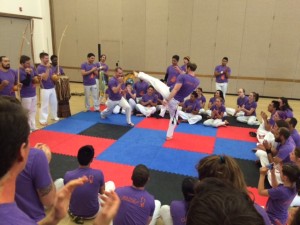
The BYU Capoeira club, in association with Utah Valley Capoeira, hosted a capoeira performance event known as “Batizado” or baptize this past Saturday, Oct. 17, 2015 in the WSC East terrace.
People from all around the United States and some as far as Brazil gathered to participate in this event to celebrate the martial art form of capoeira. This event not only showcased the hard work of capoeira students here in Utah Valley, but also exposed the average person to the various benefits capoeira offers compared to more traditional martial arts.
Nery Ralon, vice president of marketing for the BYU Capoeira club, expressed that capoeira is often viewed as just a martial art but said it covers a variety of different things.
“People usually think capoeira is purely a martial art but you learn so many other things,” Ralon said. “You also learn rhythm, Portuguese, how to play instruments, how to sing in Portuguese; You learn Brazilian culture acrobatics and gymnastics.”
Ralon explained capoeira is culturally different compared to other martial arts due to its Afro-Brazil origins. He said capoeira was originally brought to Brazil by African slaves and wasn’t legalized in Brazil until the 1940s, due to negative perception of the art and those who practiced it.
“In order to fight oppression, physically, literally and metaphorically, slaves would practice capoeira,” Ralon said. “As time progressed and slavery became a thing of the past it was still not looked upon as a good thing because it was something created and practiced mainly by those who were poor and uneducated.”
Capoeira has shifted from something originally looked down upon in Brazilian society to a globally respected martial art that is practiced by those of all walks of life according to Ralon.
Arles “Espeto” Lara, a capoeira instructor and co-owner of Utah Valley Capoeira School, explains more on what a Batizado is.
“The event that took place is “Batizado” or baptize/baptism. This event celebrates capoeira and acknowledges our student’s hard work and gives them a chance to advance in rank,” Lara said ” Traditionally it’s held with a “mestre” or master, so we invited a guess from out of town to help us out with that.”
Avilez “Dilaho” Oliveira, a “Mestre” or Master of Capoeira, was flown in from Portland, Oregon to assist with the Batizado and to award students their new belts. Oliveira expressed his love for the art and how it has blessed his life.
“I have been practicing capoeira for 30 years. Capoeira has benefitted me in every aspect of my life,” Oliveira said.
Capoeira training can be accessed by signing up for a capoeira school such as Utah Valley Capoeira or attending BYU Capoeira club events even though a traditional Batizado happens less frequently and requires a master to assist the event.
The BYU Capoeira club meets every Tuesday at 7:00pm in the WSC terrace.
“Everyone is welcome and there’s no need to bring a partner. From 7-8pm we learn tricks and kicks then at 8pm we do the ‘roda’ or circle,” Ralon said.
The BYU Capoeira club invited all to come out Tuesday nights and see all what capoeira has to offer.
“Some feel self conscious but that’s normal, it’s not something to miss out life events on,” Lara said. “Leave your inhibitions at the door and come and enjoy this healthy sport and pastime.”




